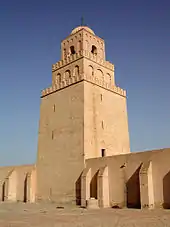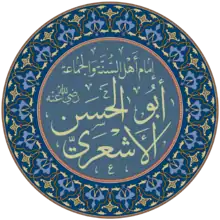Abdullah al-Ghumari
Abu al-Fadl Abdullah bin Muhammad bin al-Siddiq al-Ghumari (1910–1993) was a Moroccan preacher, jurist and theologian.[2]
Abdullah bin al-Siddiq al-Ghumari | |
|---|---|
| Personal | |
| Born | 1910 |
| Died | 1993 |
| Religion | Islam |
| Nationality | Moroccan |
| Ethnicity | Moroccan |
| Denomination | Sunni |
| Jurisprudence | Maliki[1] |
| Creed | Ash'ari |
| Movement | Sufism |
| Alma mater | Al-Azhar University |
| Tariqa | Shadhiliyyah |
| Occupation | Hadith scholar |
Life
Ghumari was born in Tangier in 1910, and died there in 1993.[3] As a child, he was primarily educated by his father Muhammad bin al-Siddiq al-Ghumari, an Islamic scholar. He memorized the Qur'an at an early age, in addition to Bulugh al-Maram, Alfiya and Ajārūmīya in Arabic grammar.
Ghumari later travelled to Fas for his higher education, but then enrolled in the University of al-Karaouine. While there, he also studied Mosque of Uqba,[3] a UNESCO World Heritage Site and important seat of Muslim religious learning.[4] During his study, Ghumari studies canonical texts in Sunni Islam, including Al-Qastallani's explanation of Sahih al-Bukhari and the works of Khalil ibn Ishaq al-Jundi.[3] Eventually, Ghumari switched from Karaouine to Al-Azhar University in 1930 and graduating the next year. During his education, Ghumari was a student of Al-Kawthari, of whom Ghumari would later hold extremely negative views.[5]
Due to fears in the wider Arab world regarding the influence of the Muslim Brotherhood in the mid-twentieth century, Ghumari was accused of having ties to a foreign group. In 1961, he was sentenced to ten years in prison, likely due to his time spent in Egypt where the Brotherhood had formed. His older brother, Ahmad al-Ghumari, fell ill upon hearing of his younger brother's long sentence and died eight months later.
Teachers
He studied under Muhammad al-Tahir ibn 'Ashur, Yusuf al-Nabhani, Muhammad Zahid al-Kawthari, Muhammad Bakhit al-Muti'i, and Hasanayn Muhammad Makhluf.[6]
Students
Ghumari's students included Salâh Ud Dîn At Tijânî and Muhammad bin Yahya al-Ninowy, Hassan al-Kattani.[7][8][9][10] Hamza Yusuf received an ijazah from him.[11]
Citations
- "A Short Biography of 'Abdallah b. al-Siddiq al-Ghumari". elwahabiya.com.
- Mustafa Shah, The Hạdīth: Scholarship, perspectives, and criticism, Routledge, 2010, p. 210
- The Biography of Abu al Fadl Abdullah bin as-Siddiq al-Ghumari who died in the year 1413AH, written and translated by Riad Nachef. Available at:
*Ayouby.com
*Riad Nachef, Islamic Affairs - Great Mosque of Kairouan (discoverislamicart.org) Archived 2013-04-07 at the Wayback Machine
- Gibril Haddad, The Ghumari School. 6 December 2002: Living Islam. Last updated 2 June 2003.
- "A Short Biography of 'Abdallah b. al-Siddiq al-Ghumari". ayouby.com.
- Shaykh Muhammad Bin Yahya An-Ninowy. 2009: Al Buruj Press.
- Shaykh Muhammad al-Ninowy: Senior Instructor. The Deen Institute.
- Shaykh Muhammad al-Ninowy. Gateway to Divine Mercy.
- Cordoba Academy Faculty
- Archived 2013-01-26 at the Wayback Machine, Cordoba Academy. Accessed February 17, 2013.

